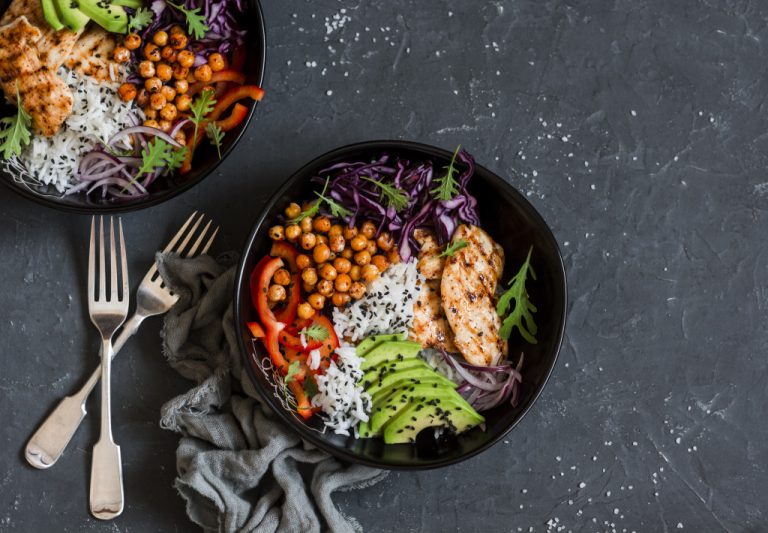Are you struggling to lose weight, despite your best efforts? You’re not alone. In fact, according to the Centers for Disease Control and Prevention (CDC), over 40 percent of American adults are obese. But don’t despair — there are plenty of ways to eat healthier and lose weight without depriving yourself of or going on a crazy diet. Here are some tips to get you started.
Plan your meals so that you don’t order fast food on the go
You’ll save money and calories by planning your meals ahead of time. Putting together a good grocery list also ensures that you’ll only buy necessities for healthy eating, like whole grains, fresh fruits and vegetables, lean meats (like chicken), and low-fat dairy products (like yogurt).
If you struggle with portion control, make yourself an easy-to-carry lunch instead of ordering fast food. You can pack a sandwich or salad and even pair it with some healthy snacks, like carrots and hummus, to keep you satisfied until dinner time rolls around.
Pack your leftovers for your next day’s work lunch
Portion control is necessary if you’re trying to lose weight, but you can still enjoy the foods you love. For example, you probably buy more than one burger at a time from your favorite fast food joint. You can save money and cut calories by splitting that order into meals for the next day’s lunch or dinner.
There are many benefits to packing leftovers for your next day’s lunch. For starters, it saves you money — you’re not paying for a meal at a restaurant. It also helps you stay on track with your diet goals since you’re eating the same healthy foods all week long. And finally, packing leftovers is a great way to reduce food waste.
Swap sugar-laden snacks for lower calorie alternatives like fruits and veggies
Don’t let your sweet tooth go unsatisfied. If you’re craving something sweet, try replacing traditional snacks (like potato chips) with sliced fresh fruit like watermelon or banana. You can also make your popcorn instead of buying pre-packaged snacks. Just coat air-popped corn with Parmesan cheese and spices like cinnamon to give your snack a sweet flavor without extra fat and calories.
For senior adults, you can let them visit a diabetes clinic to help monitor their diet and provide the necessary therapy that they need to improve their health. The clinic can also integrate health monitoring devices in their program to ensure the accurate diagnosis of their condition.
Pair lean protein with vegetables for maximum weight loss benefits

You don’t have to eat meat every day, but you should consume protein at each meal. Protein helps lower your risk of developing heart disease and can even rev up your metabolism for faster weight loss.
Not only is lean protein an excellent source of essential nutrients like B vitamins and iron, but it’s also great fat-burning food. Pairing protein-rich foods with vegetables will not only keep your belly full and satisfied, but you’ll also get all the amazing health benefits.
Eat more fiber to feel satisfied longer
Eating more fiber is one of the easiest ways to lose weight. Fiber-rich foods like fruits and vegetables are low in calories but high in volume, so they fill you up and keep you satisfied. Fiber also slows down digestion, which keeps your blood sugar stable and prevents overindulging.
Eating more fiber can help you lose weight because it keeps your digestive system running smoothly — since constipation often leads to bloating and weight gain. Plus, fiber also helps ease the symptoms of various conditions like heart disease, diabetes, high cholesterol, and obesity.
Put down the spoon and use chopsticks
Eating with chopsticks is an easy way to eat more mindfully, which can lead to eating less. Other ways you can reduce the amount of food you shovel into your mouth include using smaller plates, putting away the serving dishes after each round, and not eating directly out of the bag.
One study found that people who used chopsticks ate less food compared to those who used their hands. This may be because using utensils takes longer or cause people to consider the quality of what they’re eating instead of simply clearing their plates.
Don’t eat too fast
Eating too quickly can cause you to accidentally overeat or forget to chew your food. When you eat slowly, your brain has time to let your stomach know that it’s full — preventing overindulging and weight gain.
Not sure how to eat more slowly? Just place the utensils down between bites (instead of placing them on the table), take smaller bites, and chew each mouthful of food at least ten times before swallowing.
Eating healthy isn’t always easy, but it doesn’t have to be difficult. There are many ways to make small changes in your diet that can help you eat healthier and lose weight.

